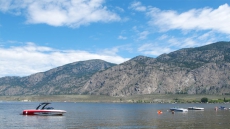VANCOUVER — Two northeastern British Columbia First Nations will suffer "irreparable harm" if thousands of hectares of old-growth forest are cleared to build the Site C dam, their lawyer says.
John Gailus told B.C. Supreme Court that a stop-work order should be issued to halt the first phase of the nearly $9-billion hydroelectric project from proceeding along the Peace River.
He said the Crown granted permits for the preparatory phase of construction without consulting with the West Moberly and Prophet River First Nations, which are members of the Treaty 8 Tribal Alliance.
"The Crown truncated their consultation and issued the permits to meet an arbitrary timeline imposed by BC Hydro, we say, contrary to both its contractual obligations and its constitutional obligations," Gailus said Tuesday.
The injunction application comes as the First Nations wait for both B.C. Supreme Court and Federal Court to deliver decisions on a judicial review aimed at quashing the hydroelectric project entirely.
The provincial government granted approval in July for the first of seven construction phases, although the work hasn't yet started.
Court heard the permits authorize the clearing of more than 1,600 hectares of forest, equivalent to about 4,500 truckloads of timber, along the south bank of the Peace River.
Construction of new access roads and bridges, expansion of quarries and removal of beaver dams, eagle nests and the alteration of 163 archeological sites — which may include burial sites — was also authorized, Gailus said.

He told court there's no urgency for starting the project.
"There are significant benefits to the B.C. taxpayers for a delay," he said, adding costs will be higher if the work is allowed to move ahead and then the project is overturned.
Outside court, West Moberly Chief Roland Willson called the consultation process a "farce."
He said the First Nations signed an agreement in April to consult with the province on the first phase, but BC Hydro's permits were approved before any meetings.
Willson was particularly concerned that up to 28 eagle nests would be destroyed.
"It doesn't mean anything to anybody if we don't even talk about it and they approve (the permits)," he said. "We actually have to sit down and work through them together."
Last month, Forests Minister Steve Thomson said each of the two dozen approved permit applications was reviewed for its potential impact on the environment and on aboriginal treaty rights.
Thomson said the province conducted an "appropriate consultation process."
BC Hydro expects construction of Site C to take at least a decade. The utility has said the project will power the equivalent of 450,000 homes per year.




